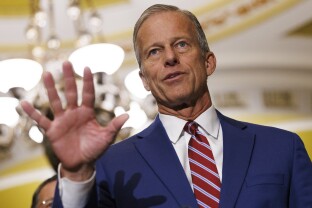Senate Republicans on Thursday voted 53-45 to allow President Donald Trump’s nominees to be confirmed in groups instead of individually.
They did so by invoking the so-called “nuclear option,” which changes the Senate rules and allows blocks of nominees to be confirmed with a simple majority, instead of the two-thirds threshold required for most actions in the chamber.
“It would have been nice not to have to go through this process,” Senate Majority Leader John Thune said on the floor on Thursday. “I think there are a lot of Democrats who are aware that they created an untenable situation, and it would have been nice to see them acknowledge that and to move to return to longtime Senate precedent.”
